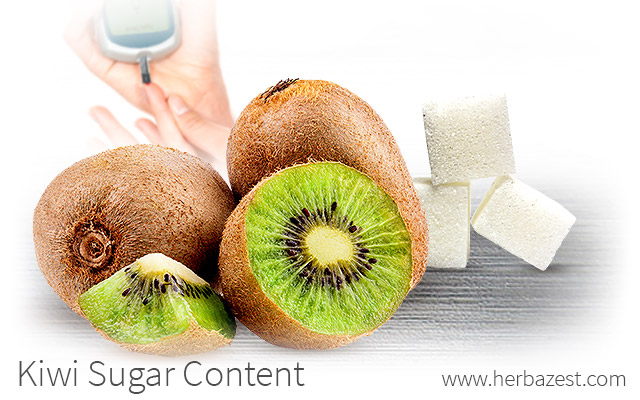Sugar is a common compound that exists naturally in foods or is added in to sweeten their taste. When evaluating the sugar content in kiwi, it is important to understand the different types of sugars and ways in which they work within the body.
What Is Sugar?
Sugars are simple carbohydrates found naturally in fruits, vegetables, and milk. However, sugar can also be artificially produced and added to a variety of products. The digestive system breaks down sugar into glucose, which is an extremely important source of fuel for the body, since cells use it to produce energy. The main types of sugar are glucose, fructose, and sucrose.
BESIDES ITS SWEET, AGREEABLE TASTE, NATURAL SUGAR IS BENEFICIAL FOR FUELING BIOLOGICAL FUNCTIONS.
Most carbohydrates become glucose, which is absorbed faster than other sources of energy, including fat and protein. The speed at which glucose is released varies depending on the type and amount of food ingested, and can be measured by the glycemic index (GI). A high GI is when glucose is released quickly from food, and is considered to be above GI 70. Conversely, when glucose is released slowly, it generates a low GI, which is considered below GI 50. GI levels help show the overall effect of a serving of food on blood glucose levels.
How Much Sugar Is in a Kiwi?
The total sugar content of kiwi is about nine grams per 100 grams. The majority of sugar in a kiwi is made up of glucose (4.11 g/100 g) and fructose (4.35 g/100 g). Low amounts of other types of sugar - sucrose, lactose, maltose, and galactose - are also present in kiwi.
A study published in the journal Advances in Food and Nutrition Research (2013) found that 100 grams of kiwifruit are equivalent to roughly one teaspoon of glucose.
KIWI'S SUGAR CONTENT HAS A LOW GI AND CAN HELP REGULATE BLOOD GLUCOSE LEVELS.
The low GI of kiwi sugar may be the result of a high concentration of fructose. According to a study published in The Journal of Nutrition (2009), this low GI means that fructose may be beneficial for type 2 diabetes patients.
While the sugar content in kiwi makes this fruit a great source of energy, it is important to note that sugar, being a simple carbohydrate, contains no nutritional value other than energy, so consumption should be monitored and minimized in people trying to lose weight.
A sugar content made up mostly of glucose and fructose can be count as one the many kiwi benefits, since it can help provide the energy needed for the body to function. While intake should be monitored, kiwi sugar is safe and can may be even beneficial for diabetic individuals.
Sources
- National Library of Medicine, Definitions of Health Terms: Nutrition, Sugar
- Sugar Nutrition UK, What is sugar?
- The Journal of Nutrition, Dietary Fructose and Glucose Differentially Affect Lipid and Glucose Homeostatis
- USDA Nutrient Database, Kiwifruit, green, raw
- Advances in Food and Nutrition Research, Kiwifruit, carbohydrate availability, and the glycemic response, 2013




